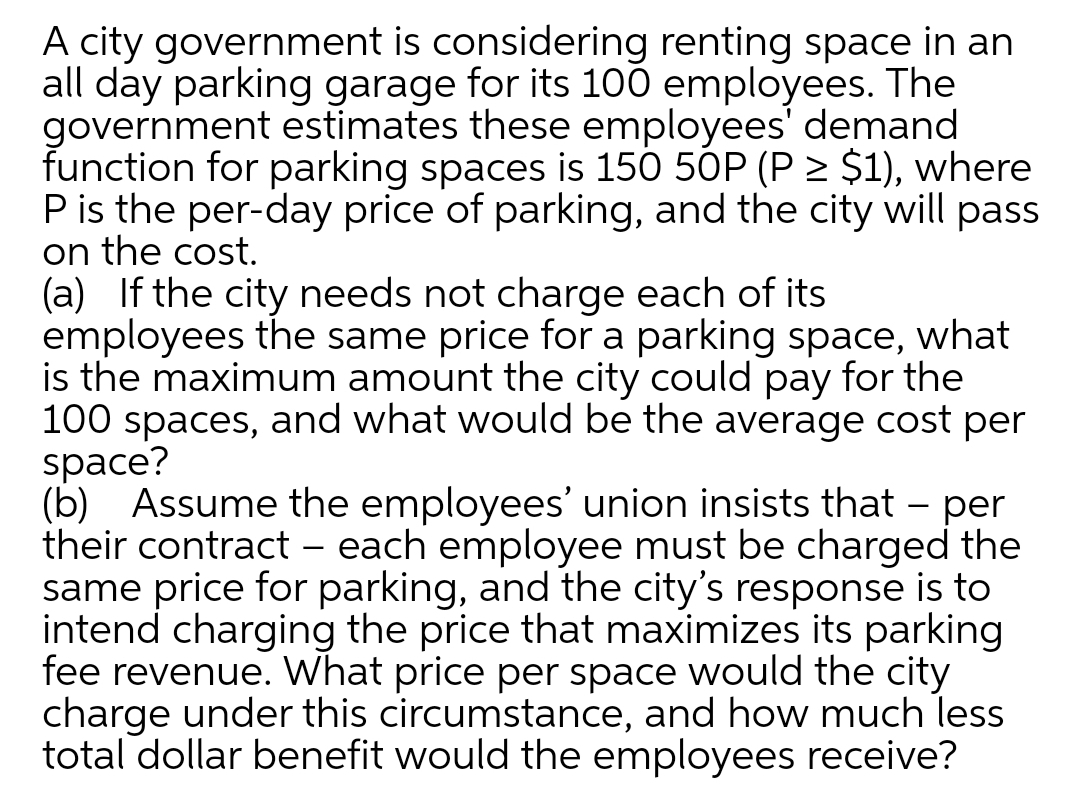A city government is considering renting space in an all day parking garage for its 100 employees. The government estimates these employees' demand function for parking spaces is 150 50P (P 2 $1), where Pis the per-day price of parking, and the city will pass on the cost. (a) If the city needs not charge each of its employees the same price for a parking space, what is the maximum amount the city could pay for the 100 spaces, and what would be the average cost per space? (b) Assume the employees' union insists that – per their contract – each employee must be charged the same price for parking, and the city's response is to intend charging the price that maximizes its parking fee revenue. What price per space would the city charge under this circumstance, and how much less total dollar benefit would the employees receive?
A city government is considering renting space in an all day parking garage for its 100 employees. The government estimates these employees' demand function for parking spaces is 150 50P (P 2 $1), where Pis the per-day price of parking, and the city will pass on the cost. (a) If the city needs not charge each of its employees the same price for a parking space, what is the maximum amount the city could pay for the 100 spaces, and what would be the average cost per space? (b) Assume the employees' union insists that – per their contract – each employee must be charged the same price for parking, and the city's response is to intend charging the price that maximizes its parking fee revenue. What price per space would the city charge under this circumstance, and how much less total dollar benefit would the employees receive?
A First Course in Probability (10th Edition)
10th Edition
ISBN:9780134753119
Author:Sheldon Ross
Publisher:Sheldon Ross
Chapter1: Combinatorial Analysis
Section: Chapter Questions
Problem 1.1P: a. How many different 7-place license plates are possible if the first 2 places are for letters and...
Related questions
Concept explainers
Contingency Table
A contingency table can be defined as the visual representation of the relationship between two or more categorical variables that can be evaluated and registered. It is a categorical version of the scatterplot, which is used to investigate the linear relationship between two variables. A contingency table is indeed a type of frequency distribution table that displays two variables at the same time.
Binomial Distribution
Binomial is an algebraic expression of the sum or the difference of two terms. Before knowing about binomial distribution, we must know about the binomial theorem.
Topic Video
Question

Transcribed Image Text:A city government is considering renting space in an
all day parking garage for its 100 employees. The
government estimates these employees' demand
function for parking spaces is 150 5ÓP (P > $1), where
Pis the per-day price of parking, and the city will pass
on the cost.
(a) If the city needs not charge each of its
employees the same price for a parking space, what
is the maximum amount the city could pay for the
100 spaces, and what would be the average cost per
space?
(b) Assume the employees' union insists that – per
their contract – each employee must be charged the
same price for parking, and the city's response is to
intend charging the price that maximizes its parking
fee revenue. What price per space would the city
charge under this circumstance, and how much less
total dollar benefit would the employees receive?
Expert Solution
This question has been solved!
Explore an expertly crafted, step-by-step solution for a thorough understanding of key concepts.
Step by step
Solved in 2 steps

Knowledge Booster
Learn more about
Need a deep-dive on the concept behind this application? Look no further. Learn more about this topic, probability and related others by exploring similar questions and additional content below.Recommended textbooks for you

A First Course in Probability (10th Edition)
Probability
ISBN:
9780134753119
Author:
Sheldon Ross
Publisher:
PEARSON


A First Course in Probability (10th Edition)
Probability
ISBN:
9780134753119
Author:
Sheldon Ross
Publisher:
PEARSON
